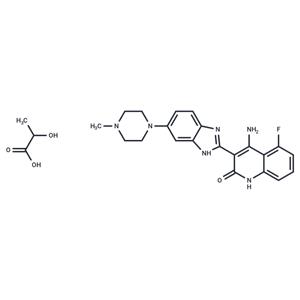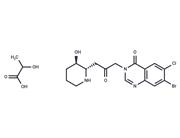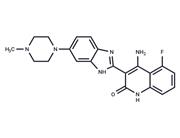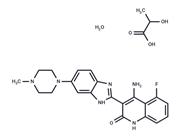| Name | Dovitinib lactate |
| Description | Dovitinib lactate (TKI-258 lactate)(TKI258) lactate is a potent inhibitor of fibroblast growth factor receptor 3 (FGFR3) (IC50 :5 nM). |
| Cell Research | Determination of cell proliferation by 3,[4,5-dimethylthiazol-2-yl]-2,5-diphenyl-tetrazolium bromide (MTT) assay.?Different leukemic cells were seeded into a 96-well plate at a density of 5×10^3 cells per well and exposed to different concentrations of TKI258, with or without RAD001, in culture medium.?After incubation for indicated time points.Cell-cycle analysis:For cell-cycle analysis, cells were exposed to different concentrations of TKI258, with or without RAD001, in growth medium.?After different culture durations, cells were harvested and fixed in 70% ethanol at 4°C for over 30 min. After incubation for indicated time points, DNA contents were stained.Apoptosis analysis:Cell apoptosis was detected by determining phosphatidylserine expression on the cell surface[1]. |
| Animal Research | 21-0208 and SK-HEP1 cells as well as patient-derived HCC models were employed to study the antitumor effect of dovitinib.?Changes of biomarkers relevant to FGFR/VEGFR/PDGFR pathways were determined by Western blotting.?Microvessel density, apoptosis and cell proliferation were analyzed by immunohistochemistry[1]. |
| In vitro | ALL cells were extremely sensitive to TKI258 treatment with a concentration for 50% inhibition of cell proliferation (IC50) values in the nanomolar range in vitro.?By combination with mTOR inhibitor RAD001, a synergistic effect on cell death and cell proliferation was observed in these cells[1].Treatment of SK-HEP1 cells with dovitinib resulted in G2/M cell cycle arrest, inhibition of colony formation in soft agar and blockade of bFGF-induced cell migration. Dovitinib inhibited basal expression and FGF-induced phosphorylation of FGFR-1, FRS2-α and ERK1/2[2] |
| In vivo | In vivo, dovitinib potently inhibited tumor growth of six HCC lines.?Inhibition of angiogenesis correlated with inactivation of FGFR/PDGFR-β/VEGFR-2 signaling pathways.?Dovitinib also caused dephosphorylation of retinoblastoma, upregulation of p-histone H2A-X and p27, and downregulation of p-cdk-2 and cyclin B1, which resulted in a reduction in cellular proliferation and the induction of tumor cell apoptosis.?In an orthotopic model, dovitinib potently inhibited primary tumor growth and lung metastasis and significantly prolonged mouse survival[2]. |
| Storage | Powder: -20°C for 3 years | In solvent: -80°C for 1 year | Shipping with blue ice/Shipping at ambient temperature. |
| Solubility Information | DMSO : 10 mg/mL (20.72 mM), Sonication is recommended.
|
| Keywords | VEGFR | Vascular endothelial growth factor receptor | TKI-258 Lactate | TKI258 Lactate | TKI-258 | TKI258 | TKI 258 Lactate | TKI 258 | SCFR | Platelet-derived growth factor receptor | PDGFR | Inhibitor | inhibit | Fms like tyrosine kinase 3 | FLT3 | Fibroblast growth factor receptor | FGFR3 | FGFR | Dovitinib lactate | Dovitinib Lactate | Dovitinib | Cluster of differentiation antigen 135 | c-Kit | cKit | CHIR-258 Lactate | CHIR258 Lactate | CHIR-258 | CHIR258 | CHIR 258 Lactate | CHIR 258 | CD135 | CD117 |
| Inhibitors Related | Ribociclib | Gilteritinib | Amlexanox | Nintedanib | Regorafenib monohydrate | Sorafenib | Ferulic Acid | Regorafenib | Formononetin | Imatinib | Pazopanib | Axitinib |
| Related Compound Libraries | Anti-Lung Cancer Compound Library | Bioactive Compound Library | Membrane Protein-targeted Compound Library | Kinase Inhibitor Library | Tyrosine Kinase Inhibitor Library | Anti-Cancer Clinical Compound Library | Drug Repurposing Compound Library | Angiogenesis related Compound Library | Inhibitor Library | Bioactive Compounds Library Max | Anti-Cancer Drug Library | Anti-Cancer Active Compound Library |

 United States
United States






